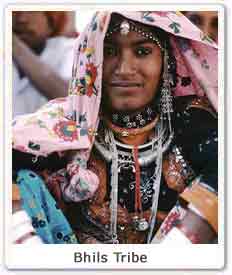Bhils are popularly known as the bow men of Rajasthan. They are the most widely distributed tribal groups in India. They forms the largest tribe of the whole South Asia. Bhils are mainly divided into two main groups the central or pure bills and eastern or Rajput Bhils. The central Bhils are found in the mountain regions in the Indian states of Madhya Pradesh, Maharashtra, Gujrat and Rajasthan. Bhils are also found in the north eastern parts of Tripura.
 History
:
History
: Bhils belong to the race of the pre-Aryans. The name 'Bhil' is derived from the word villu or billu, which according to the Dravidian language is known as Bow. The name Bhil is also finds mentioned in the great epic called Mahabharata and Ramayana. The Bhil women offered ber to Lord Rama, when he was wandering through the jungles of Dhandaka, searching Sita. The popular legend represents them as being descended from Nishada, son of Mahadev by the human female. Nishad was brutal and ugly, who killed his fathers bull and as the consequence he was banished to mountains and forests. During the ancient era they were considered as the great warriors who fought against the Mughals, Marathas and the Britishers.
Language and Costumes :
Apart from other states, Bhils comprise 39% of Rajasthan's total population. speak Bhili, which is an Indo Aryan language. Bhil women wear traditional saris and the Bhil men wear loose long frock along with pyjama. The peasants wear turbans. Bhils also wear brass ornaments. Bhils are tall, well built with the handsome features. They are known for their truthfulness and simplicity. They love independence. They are brave and their National weapon is bow made of bamboo. Earlier they were the great haunters. They now practice agriculture as the source of livelihood.
Culture and Religion :
Religion practice among the Bhils differ from place to place. Most of them worship local deities like Khandoba, Kanhoba, Bahiroba, and Sitalmata. Some of the worship Tiger God called 'vaghdev'. They have no temples of their own. They consult Badvas -the hereditary sorcerers on all the occasions. Bhils are highly superstitious tribal people. They have Bhagat or Gurus who perform the religious rites. They have village headsmen, who deals with their disputes. Bhils strictly follow rules and regulations. They marry only in their own classes. Their close relationships are tightly based on mutual love and respect. They have rich cultural history and gives much importance to dance and music. Ghoomar is the most famous dance among the Bhils. Than Gair is the religious dance drama performed by the men in the month of Sharavana (July and August). The Bhils are talented in the sculptured work. They make beautiful horses, elephants, tigers, deities out of clay.
Fair and Festivals :
The Baneshwar fair is the main festival celebrated among the Bhils. This fair is held during the period of Shivatri (in the month of January or February) and is dedicated to Baneshwar Mahadev also known as Lord Shiva. On this occasion Bhils gather all together set up camps on the banks of the Som and Mahi river. They perform dance around the fire and sing traditional songs. At night they all of them enjoy raslila at the Lakshmi Narayan temple. Cultural shows, magic shows, animal shows acrobatic feast are the main attraction of the fair. This fair is actually the combination of two fairs, which are held in reverence of Lord Shiva and the other one that commenced after the setting up of Vishnu temple by Jankunwari. Holy and Dusshera are the other major festivals celebrated among the Bhils in India.






